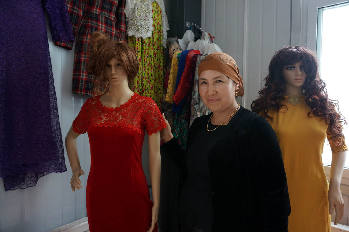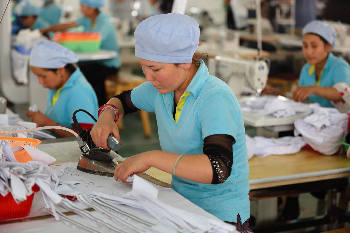Sewing a Beautiful Life
By staff reporter ZHANG HUA
|
|
|
Pioneer Zuoreguli started her own business after taking up the county government’s offer of rent-free premises. |
SIXTY-year-old Zhatihan never expected to find a job at her age. She lives in Pingdingshan Community in Hongmiaozi Street of Urumqi City, a neighborhood which is home to poorly-educated, unskilled migrant workers only able to subsist on odd jobs. Zhatihan is stricken with an even worse plight, however: her two sons, both in their early 20s, are unable to work because of chronic diseases.
Last April, a free sewing training seminar held by Xinjiang Shine Jewel Garment Co., Ltd raised Zhatihan’s hopes. As the seminar was right in her community, it was an ideal opportunity for her and 20 other women to learn a new skill. “After one month, I was able to earn RMB 1000 every month,” said Zhatihan. Stable income has made her more confident about the future.
According to the human resources and social security authorities of Xin-jiang Uygur Autonomous Region, from 2010 to 2014, about 315,600 persons in urban areas obtained employment with government assistance, among whom 29,000 were from “zero employment” families.
Free Training, Secure Jobs
The changes that happened in Zhatihan’s life re-affirmed the resolve of Shaliya, a Kazak and president of Shine Jewel Garment, to teach skills to the unemployed and help them find jobs. She herself lost her job in 2002 when a state-owned garment company declared bankruptcy. She then experienced a very difficult period, but later decided to start her own company from scratch. The company is now quite successful, with an annual sales volume of RMB 10 million, and its market has expanded into Central Asia.
Since September 2014, Shaliya has undertaken field research in several communities where ethnic minority groups are concentrated. She found that many families in the district where Zhatihan’s community is located had several children each. Women were hence unable to obtain jobs as they spent most of their time on child care. As a result, their social status steadily sank.
During her research, Shaliya learned that Pingdingshan Community had engaged companies in the handicraft and garment industries to offer residents free training in addition to opening a community language school and other measures. The project aimed to help unemployed women find work near their homes, so they could take care of their families while raising their incomes.
Shaliya actively participated in the project. Her trainees all became her employees after a month’s study. These novices could earn up to RMB 2,500 a month and enjoy social security that the company paid for on their behalf. The mode has been successfully replicated in several other communities, involving over 100 women.
“We plan to popularize this model in multiple communities in Urumqi and in future in southern Xinjiang, which is a major cotton-producing region.” Shaliya said. She is confident about this win-win mode, “With the full support of the government, I believe that within three years the project will help over 10,000 people obtain a skill and find a job.”
Start Your Own Business
|
|
|
Clothing companies like Shangyi provide women more opportunities. |
In October 2014, Huocheng County in northwestern Xinjiang decided to lease vacant rural land and office space for free to small labor-intensive enterprises, particularly those involved in ethnic handicrafts. Zuogureli’s company became one of the pioneers in the “Start Your Own Business” park. She now employs over 50 women to produce women’s overcoats and nightgowns. In the scarcely one year that has elapsed since she moved into the park, her company has gained a net profit of RMB 700,000, and workers’ annual income has increased from RMB 10,000 to 30,000.
According to Mahemu Tijiang, magistrate of Huocheng County, as of 2014, the industrial park had attracted investment amounting to RMB 120 million, and the companies’ annual output value reached RMB 207 million. The park provides over 500 job positions, in addition to 700 related jobs.
Industrial Development Improves People’s Livelihood
The Shangyi Garment Company factory stands out on the vast barren Gobi area in Pishan County of Hotan Prefecture. The company’s owner Fang Liqin comes from Anhui Province in southeastern China. A few years ago she decided to invest in Xinjiang to support local development.
In recent years, the Anhui provincial government has emphasized industrial development when it provides aid to Xinjiang, which is part of a national program. Entrepreneurs from Anhui were encouraged to investigate the investment environment in the region. Fang Liqin is one of them. In October 2013, she went to Pishan and several other counties in southern Xinjiang and was shocked at the poor standards of living there. Situated in southern Xinjiang and the southern stretch of the Taklamakan Desert, Pishan County suffers from a harsh natural environment. The county has a population of 260,000, but has just 450,000 mu (30,000 hectares) of arable land. The county’s per capita annual income was a mere RMB 4,525 in 2013. “I felt compelled to give them a hand on seeing the local realities,” Fang said.
At the Second Central Work Conference on Xinjiang and the Seventh Plenary Session of the Eighth CPC Xinjiang Committee in 2014, the development of the textile and garment industries was stressed, with the aim of promoting local employment.
Xinjiang is the top cotton growing area in China with textiles and garments as a time-honored industry. It produces over 4.2 million tons of quality cotton every year, thus accounting for 60 percent of the country’s annual cotton output. Moreover, Xinjiang boasts other abundant textile resources, including wool, cashmere and linen. Furthermore, the price of electricity in Xinjiang is much lower than in most other parts of the country, which is certainly an appealing factor for investors.
In addition to these advantages, the Belt and Road Initiatives and the strategy of developing local textile and garment industries have further facilitated Xinjiang’s industrial development. A special fund of RMB 20 billion has been set up to promote the textile and garment industries. A broad range of policies that support these industries have been launched as well, concerning taxation, transport, training and social security for employees. Fang Liqin considers these opportunities vital to companies’ development.
Upon returning from her visit to Xinjiang, Fang sold her four-star hotel in Anhui and integrated her business in the Yangtze River Delta to invest in Pishan County together with several other entrepreneurs from Anhui.
At the end of March 2014, with an investment of RMB 210 million, the Shangyi Garment Company started to construct its factory. In only six months, a complex covering an area of 62,000 square meters was complete. On September 28 of that year pilot production commenced. The company is expected to produce 2.5 million garments each year. The factory in Pishan mainly processes material transported from eastern China. The final products are transported to Shanghai and exported from the port there. As of August 2015, the company had generated net profits of RMB 60 million.
Furthermore, over 1,000 local surplus laborers and graduates from vocational high schools have been employed with this company. Buatikai Yibulayimu and Mukaidaisi Abuduaini speak fluent Mandarin and serve as leaders of the groups that manufacture sweaters. They often talk about changes in their lives. They might have been working as farmers and doing heavy farm work all their lives if the factory had not been built in their hometown. “But now we are industrial workers and live a better life,” they enthused.
To their delight, the company has promised that staff working for the company for over five years will be able to purchase an apartment built by the company at a subsidized price. “In that case, our social status will be further raised. Women won’t have to be forced to marry in their teens or early 20s. Even in marriage, women expect to have a say,” Buatikai Yibulayimu and Mukaidaisi Abuduaini observed.
In addition, the workers are proud that the clothes they’ve made are well received by the five Central Asian countries lining the Silk Road Economic Belt.
As of the present, the regional government of Xinjiang has consummated 150 major projects related to people’s livelihoods as they promised. Per capita net income in rural areas has increased by 13.7 percent to RMB 8,296. Per capita disposable income for urban residents has reached RMB 22,160, an increase of 11.5 percent. The growth rates of their incomes have ranked high in China for three successive years. Moreover, 470,000 jobs have been created, while the number of impoverished persons has fallen by 410,000.
Hu Kaijiang, director of the Economic and Information Commission of Xin-jiang, remarked: “Advancing industries in a rational and orderly way while encouraging enterprises that may create more jobs and improve people’s livelihood to invest in Xinjiang is of benefit in increasing the incomes of farmers and herdsmen. It also gives them confidence to build a better life and helps them become more involved in modern society, as well as boosting the local economy.”


